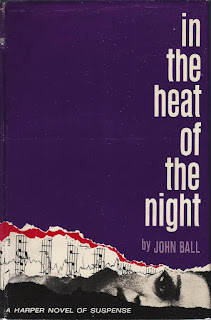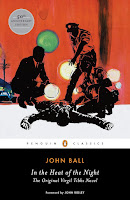By Steven Nester
Things were beginning to look up for the town of Wells, South Carolina. A music festival was in the works and sentiment held it could rejuvenate the sleepy whistle-stop; but murder can halt just about anything dead in its tracks. As this story opens, the festival’s conductor is found bludgeoned to death, and the town’s untrained police department has no clue as to how to investigate the crime. A seasoned homicide detective happens to be passing through and his superiors
 in Pasadena, California, give Wells Police Chief Bill Gillespie the OK for him to assist. The only problem is that the investigator, Virgil Tibbs, is Black; and in 1965, in the Deep South, that’s trouble. So much so, that Tibbs’ first contact with the Wells Police Department is when he’s arrested as the prime suspect.
in Pasadena, California, give Wells Police Chief Bill Gillespie the OK for him to assist. The only problem is that the investigator, Virgil Tibbs, is Black; and in 1965, in the Deep South, that’s trouble. So much so, that Tibbs’ first contact with the Wells Police Department is when he’s arrested as the prime suspect.In the Heat of the Night (1965), the first book in Ball’s Inspector Tibbs series, is a hard look at racism in the modern era, in a not-so-modern South, in the country that many believed to be the most just, fair, and principled in the world (a belief that has lately been questioned), and author John Ball pulls no punches. With its ample use of the N-word, its catalogue of racial stereotypes passed off as casual character observations, and its piles of indignity heaped upon African Americans (in addition to slights against Italian Americans and Chinese Americans), just as the Civil Rights Movement was gaining traction, In the Heat of the Night presents something that is the hopeless opposite of the American Dream. However, the book also demonstrates faith that things might change—and it’s up to Virgil Tibbs to set the example.
Tibbs is the first Black man Wells residents have seen who goes against stereotypes. He also gracefully exceeds the behavior that southern whites expect of him (and exceeds their behavior as well), prompting this backhanded compliment from a cop:
“Smartest black I ever saw,” Pete concluded; then he added a remarkable tribute. “He oughta been a white man.”No one appreciates that type of behavior at all in the South in the ’60s. And there are plenty of other attributes for the residents of Wells to dislike about Tibbs, too. He knows French and martial arts, he “dresses like a white man,” and he has a large vocabulary. But Tibbs doesn’t flaunt his accomplishments; he’s an educated African-American man who defers to his inferiors in the name of professionalism, and with respect and tact, schools an ignorant populace and hapless constabulary on professional crime solving and how to treat one’s fellow man in the face of humiliation and threats of violence. However, Tibbs does bring a bit of fight to the Wells cops, as in this famous exchange most people recognize from the movie version of Ball’s yarn, but which (slightly modified) is also in the book:
“You’re pretty sure of yourself, aren’t you Virgil.” Gillespie retorted. “Incidentally, Virgil is a pretty fancy name for a black boy like you. What do they call you around home where you come from?”Sam Wood is the officer who both discovered the body of festival conductor Enrico Mantoli and arrested Tibbs. He has no formal police training, only a badge and a gun, and less juice than Chief Gillespie, whose previous experience in law enforcement was as a jail guard strong-arming drunks. Wood and Gillespie hide their ineptitude behind condescension toward others who seek to give advice and guidance. The two don’t get along, and Sam hopes Gillespie “makes a public fool of himself and bungles the [Mantoli] case.” He’s also amused to watch Tibbs stand up to Gillespie’s bullying and bluster during the initial interrogation, when no one yet knows Tibbs is a cop. (It seems the contents of Tibbs’ wallet were never checked.) His composure under pressure and lack of deference infuriates Gillespie, who can only intimidate, his “voice trying to pick a fight, and daring anyone to defy it.” Over the course of this novel, Tibbs inspires Wood to start thinking a bit for himself and to rebel against Gillespie in subtle ways. But even though Wood is “beginning to like Tibbs as a person,” he’s not compelled to abandon the department’s party line.
“They call me Mr. Tibbs,” Virgil answered.
When Tibbs joins the Wells investigative team, Gillespie knows the clock is ticking and his career in law enforcement is in jeopardy. Even worse, Newsweek magazine starts sniffing around the town, and Gillespie gets the sense that the entire country is breathing down his neck—as do men higher up in the pecking order than the chief. There’s no way they’re going to let things get screwed up by an unqualified sheriff, whether his incompetence is revealed by a Black man or not. The good-ol’-boy system, it seems, is against the ropes. Gillespie is in a tight spot, but he’s cagey enough about self-preservation. Virgil Tibbs, he comes to realize, is a convenient “whipping boy.” Gillespie will
 win if the murderer is found, and Tibbs will receive no credit; on the other hand, if Tibbs can’t find a killer, he’ll take the blame himself for botching the case. Tibbs, however, has already deduced all of this. He knows exactly what he’s doing.
win if the murderer is found, and Tibbs will receive no credit; on the other hand, if Tibbs can’t find a killer, he’ll take the blame himself for botching the case. Tibbs, however, has already deduced all of this. He knows exactly what he’s doing.What Virgil Tibbs does, in the hands of author Ball, is bring up white people’s fears, shortcomings, and insecurities about themselves. For instance, Ball writes that Sam Wood “wanted the crime solved, but he wanted it solved by someone he could look up to and respect. The only trouble was he couldn’t think who it might be.” Sam further exhibits his insecurities when he wishes he’d never become a police officer; he pines for his old job as a grease monkey. Meanwhile, Bill Gillespie, too, wants Mantoli’s slaying solved quickly—and he’s willing to leap to conclusions if necessary to bring that about. After Tibbs proves the innocence of the department’s initial prime suspect, and with the clock ticking, Gillespie learns that Officer Wood had paid off his mortgage in cash, roughly the same amount that was taken from Mantoli’s billfold. That’s all the chief needs to arrest his colleague for the murder. But Tibbs figures the answer lies elsewhere, and through his diligent efforts he eventually makes everyone look good.
The majority of Americans are probably more familiar with the 1967 movie version of In the Heat of the Night than they are with John Ball’s original novel. Both are engaging works. The film starred Sidney Poitier, Rod Steiger, and Warren Oates, and was directed by Norman Jewison. Poitier (who passed away earlier this month) refused to shoot the movie in the South, due to threats he and singer-actor Harry Belafonte had received from the Ku Klux Klan. The movie turned out to be a hit, winning five Academy Awards, including Best Actor for Steiger and Best Picture. A TV crime drama, inspired by the 1965 novel and 1967 film, ran from 1988 to 1995. It starred Carroll O’Connor as Chief Bill Gillespie and Howard Rollins as Detective Virgil Tibbs.
There is no happy ending in Ball’s slender book, other than in the fact that justice is done, and that a tenuous truce has been achieved, in a very small way, between Blacks and whites in the South. There’s nothing in-your-face about the conclusion, just the quiet and individual rectitude of two men who are worlds apart. However, there is one other thing worth noting. Gillespie sees Tibbs off at a train station in the middle of the night, and gives Tibbs permission—which the Pasadena detective had requested—to sit on a whites-only bench. The chief then thanks Tibbs, and Tibbs says it was a pleasure helping out. Goodbyes are said, but then Gillespie declines to offer his hand for shaking. Virgil Tibbs is left to sit alone in silence, on the whites-only bench. Metaphorically speaking, he has been left to carry on the fight for racial justice by himself, with no assistance from Gillespie or his ilk, yet he has already won approval of a sort.
READ MORE: “Remembering John Ball, the Writer Who Gave Us Virgil Tibbs,” by Kevin Mims (Quillette).

















2 comments:
Thanks for giving the book some attention here--eclipsed so often by the movie. Significant differences between the two, as you say, and glad you charted through those. The ending to the book.... not hardly triumphant. And it's fascinating to see how the changes in attitudes during the Civil Rights Era between the book's publication and the movie adaptation (and Poitier himself, of course!) may have influenced and infused the stronger portrayal of Tibbs in the film and the more positive ending.
Thanks so much for all this!
Also, I think Ball was annoyed enough by the changes in his narrative when filmed that he made sure the first sequel novel would be unfilmable, at least as an "A" feature in the US...THE COOL COTTONTAIL, ser in a nudist camp.
Post a Comment